Like many people, I arrived at Aquarius via the fandom of David Duchovny. And fan Twitter being what it is, I had expectations about who Sam Hodiak would be that really failed to prepare me for meeting this obstinate and Byronic character. But this is a show that takes the serious (though not the only legitimate) approach to serious issues, and doesn’t want to soft-pedal the 20th century by sticking John Travolta in drag; if the intention was to create a warts-and-all portrait of the ’60s, then Aquarius has succeeded. It leans heavily into issues of drug misuse and prejudice, and in light of the dark reality that it is trying to portray it makes sense that the hero of the show is not a typical hero.
“The past is a foreign country: they do things differently there.”
— L.P. Hartley, The Go-Between
But what makes something heroic anyway? In light of Hartley’s comment (above) I wonder if “hero” is culturally relative. As in—are heroes objectively heroic, or is “heroic” a subjective value judgement that must be assigned by other people? And if heroism comes from within, then must the same be said about evil?
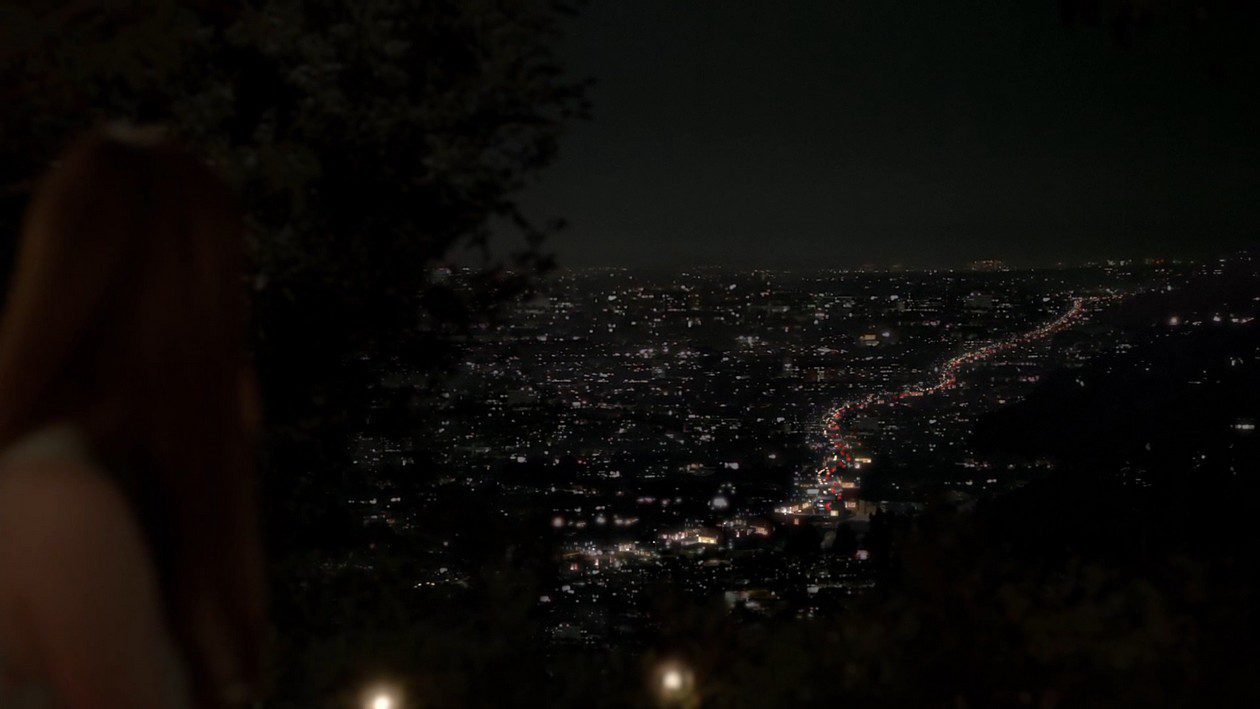
Because the importance of the so-called “Helter Skelter” scenario is so emphasised, Aquarius has intertwined the Manson Family murder spree with the disruptive race relations of the late ’60s. We may wonder whether Charles Manson would have been a murderer in any other decade, or whether he was a specific consequence of the society in which he lived. At the very beginning of the show, Manson describes the “electric snake”—the invisible but omnipresent collective of Los Angeles, waiting to devour its people, an external force that pushes people towards darkness. Should we blame the “electric snake” for Manson’s actions? Should we blame it for police brutality? Or any of the other social issues in Aquarius that are both “foreign” and unfortunately familiar?
Aside from the fact that it is a metaphor coined by an evil man trying to make himself into a messiah, we ought to do away with the “electric snake” because it is a myth. Los Angeles is not a single entity, but a series of individuals. In light of this, I will argue that the man-made collectives, or “tribes”, of Aquarius can be harmful as well as helpful, and that the concepts of justice and heroism similarly fall apart.
Is Justice an Absolute?
“You supply the most important service a government can provide to its citizens: justice.”
— Bobby Kennedy (to Sam Hodiak)
Let’s suppose for a moment that justice is an absolute. It could, for example, have been created by God. Or else, exist in the laws of nature, dutifully transcribed by lawmakers. If justice didn’t exist in this way, then according to (fictional) Bobby Kennedy, Sam Hodiak would be out of a job. However, this rather idealistic viewpoint is not upheld by Aquarius.
For a start, law enforcement acts counter-intuitively to the condition that justice is good. The LAPD wants the SDS to do something drastic, like plant a bomb and kill people, so that they can arrest them—this is a sacrifice that would lead to a victory and, therefore (as if in wartime), they consider it just. Frequently, Hodiak and his colleagues must weigh and value human lives according to their own agendas. Hodiak is nonchalant about sacrificing Roy if it means freeing his son, as he considers his son to be more valuable than a “lowlife”. I can’t fault Hodiak for being partial towards his own child, but the upshot of this is that justice becomes egoistic; this is what allows people like Gerald Dunn (who seeks to avenge his wife) to take justice into their own hands.
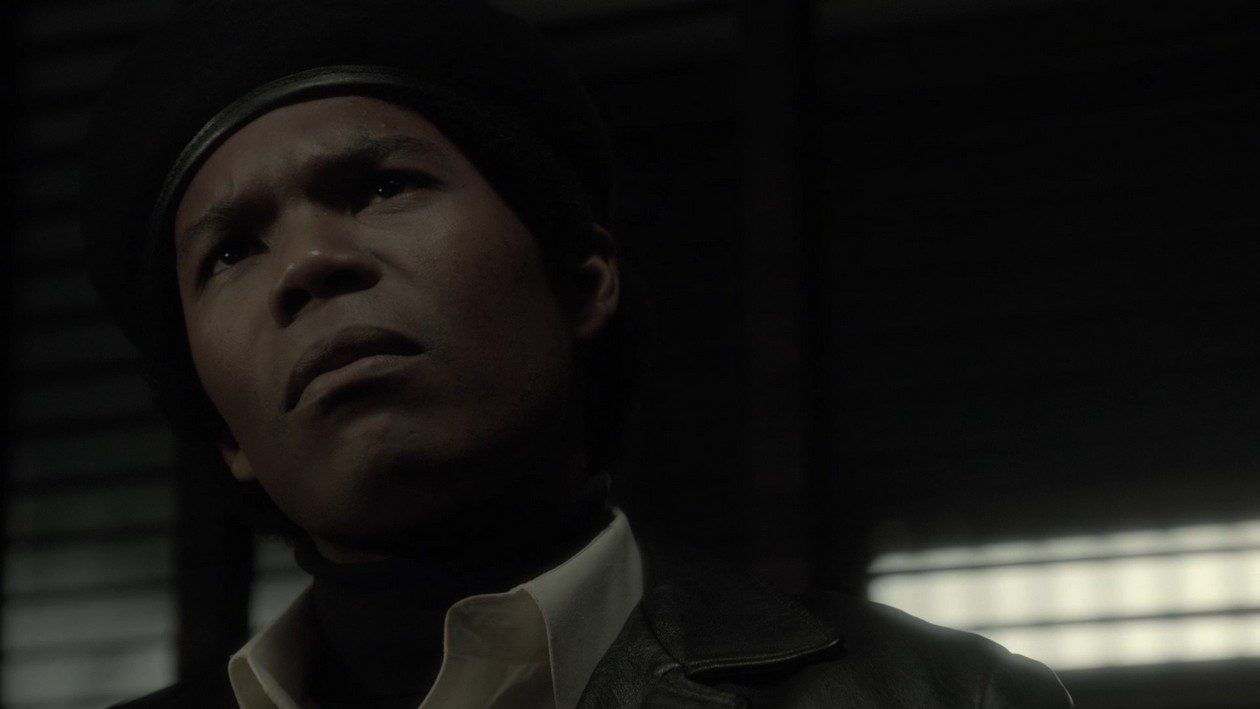
Bunchy Carter and the Black Panther Party want to make their own justice “by controlling all the institutions which exist in [their] communities” because the preexisting institutions (the LAPD and FBI) are providing a justice that is oppressive towards minorities. Aquarius makes it easy to sympathise with this point of view by illustrating how the Black and gay communities were mistreated by law enforcement. If the justice that Black people seek is different from the justice that racist cops enforce (and likewise other minority groups seek justice that is independent from their oppressors) then justice must therefore be subjective. As an aside, I must add that it is entirely possible that the cops are just incorrect about justice—certainly, when Hodiak confesses that he “did terrible things and […] called it justice” he implies that he was incorrect to do so. But, nonetheless, it is clear that people are using the same word to mean very different things.
Aquarius presupposes that it exists in an unjust world: hate crimes go unpunished, and police brutality is rewarded. The “justice” that Bobby Kennedy speaks of seems entirely out of touch. If justice is whatever the police and lawmakers decide that it is, then right on, but it becomes clear very quickly that the different characters in Aquarius, even those wearing the same uniforms, define justice differently. The least cynical of them pursue justice in the divine or Platonic sense (i.e. the LAPD does not determine justice, but aspires to it). However, this pursuit is portrayed as naive. So if it is not created by humanity, but does not exist outside of humanity, then maybe justice simply doesn’t exist. And thus is created the nihilistic wasteland in which people like Charles Manson could claim a new world order.
The Individual Versus Their Identity
“You want points for sainthood because your perfect healthy baby and wife are coloured.”
— Sam Hodiak
In Aquarius there are communities, or tribes, that have their own ways of behaving—Manson’s commune is one example, as are the LAPD, the Black Panther Party, and the U.S. army. Membership to these communities might come at the cost of some personal freedoms. It stood out to me when Hodiak was asked, “you’re a Jew?” and he responded, “no, I’m an American”—as if he can’t be both. In the world of Aquarius, identities such as “Jew” and “American”, or “cop” and “Latino”, are mutually exclusive, because loyalty to one tribe must be unwavering and exclusive. This is a glaring fault in a system that ought to be about celebrating community. I wonder then if treating the LAPD (since unlike some others, it is a tribe that one can opt out of) as its own tribe is more of a hindrance than a help.
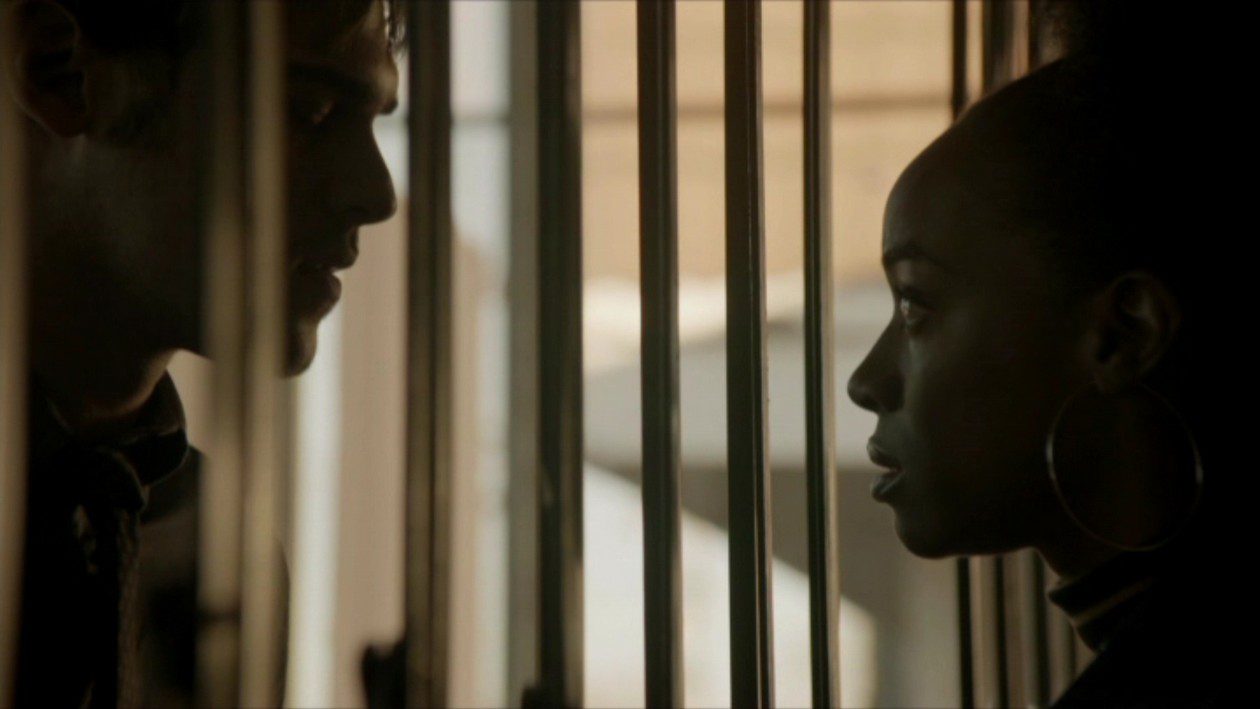
I loved seeing Kristin Shafe’s growth from being essentially just a backstory for her husband to being a wilful character with agency. Her rationality frequently cuts through her husband’s self-pity; of all the characters, she earns my respect the most. Kristin and Brian’s relationship is crucial to my exploration of identities in Aquarius. In Season 2 there is a shot of the Shafe household where the wall cuts down the middle and husband and wife are on either side; later this is mirrored when Kristin and her husband stand on opposite sides of the bars across the Black Panther headquarters. This represents the division between them; not only does it exist in the outside world, where they belong to warring tribes, it exists in their own home too.
Aquarius does not cave and tell a Romeo-and-Juliet-style story here, instead giving Kristin the strength of character to leave her husband. “You’re a part of something that’s evil,” she tells him. Brian is not beholden to his identity as a cop—it was his choice—but Kristin could not change her tribe even if she wanted to. Brian accuses Kristin of seeing all white people as slave owners; Kristin accuses Brian of seeing all Black people as criminals. As much as I would have liked to see an interracial couple prosper, it would not have made sense to give them a happy ending. In a different time, perhaps.
One of Hodiak’s colleagues—Detective Moran—has been hiding the fact that he is Cuban. He pretends to be Irish, even to his wife, and he thinks he wouldn’t have made detective if he had been honest (“if you knew I was Latino, you’d never let me be one of you”). He is referred to as “self-hating”, because he kept his heritage a secret. Similarly, the Panthers are disdainful for Black people who straighten their hair. Aquarius is highly sympathetic towards Moran, and it seems clear to me that he is not the one at fault—rather, that responsibility lies with those who made it so he had to lie in the first place.
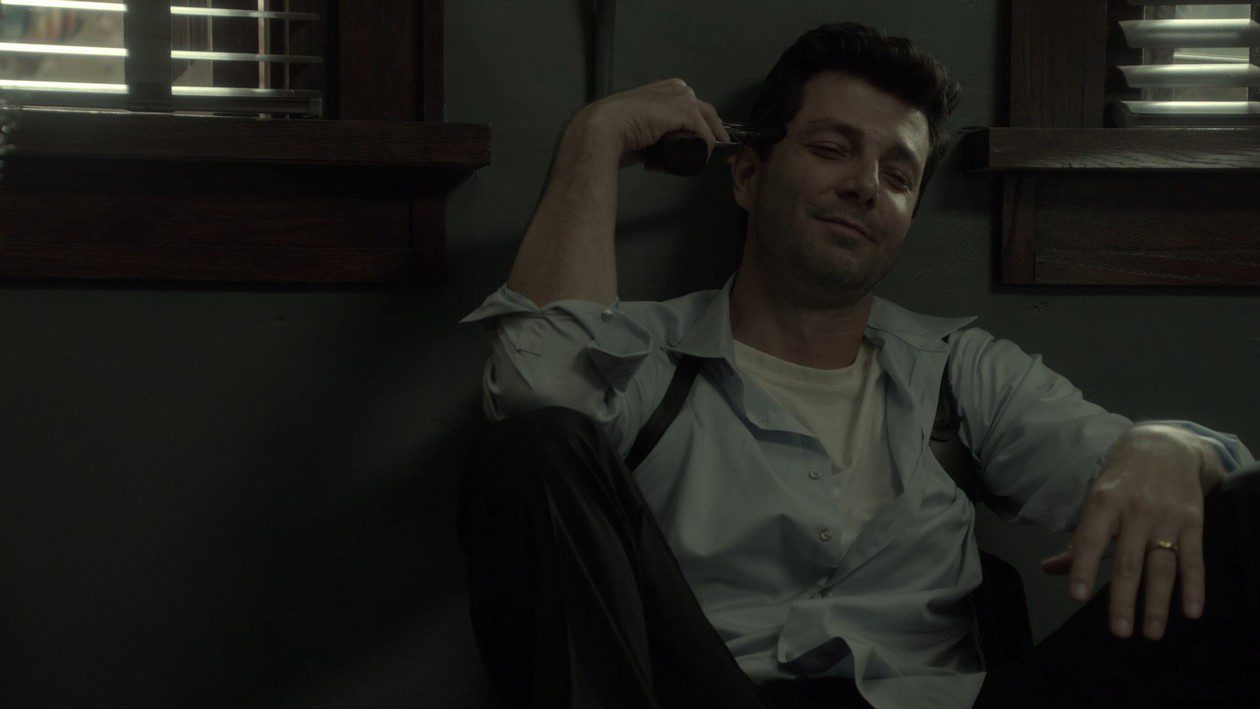
Hodiak is reticent about his Jewish heritage (for the same reasons as Moran) and feels negatively towards his father; he refers to himself as a “mongrel”, which could imply that he is ashamed. However, he later refers to himself as “a nice half-Jewish guy” in a conversation with another Jewish person. Even Sam Hodiak, man unto himself, is not immune to the need for community.
“I don’t want to be a female cop, I just want to be a cop”
— Charmain Tully
Frequently, the individual disappears behind their identity. Although the phrase “identity politics” was not coined until 1977, it is clear that the concept was already flying in the ’60s. The decade saw the founding of many gay rights groups across California, as well as the American Indian Movement, and of course the Black Panther Party. America was no longer united—arguably it never had been. Minority identities were becoming like countries within a country, with dual citizenship unpermitted. Detective Moran must be either a cop or Latino; Charmain discovers the separation between “cop” and “female cop”. Kristin Shafe faces the double consciousness of her race, as expressed in the passage of The Souls of Black Folk that Hodiak reads aloud—“One ever feels his two-ness—an American, a Negro […] two warring ideals in one dark body…” (W.E.B. DuBois). Identities ought to be celebrated, and certainly in the 21st century that is what we are told to do. I think this may be an example of Aquarius existing in Hartley’s “foreign country”—here, it seems identities can be more like burdens.
How Should Prejudice Be Portrayed?
“I know what I’d kill for, what I’d die for […] and every day on this job we get to see what other people would kill and die for, and I used to think it was different, but it’s not, it’s the same”
— Sam Hodiak
The most noticeably “foreign” aspect of Aquarius is the constant, overt, unchecked prejudice from the main characters. In the ’60s there were several laws that restricted how queer people could express themselves in public, and one such law is alluded to when it is revealed that 15 years ago Hodiak arrested gay men for kissing on New Year’s Eve. A scene of an amorous encounter between two unacquainted men in a rest stop bathroom illustrates the reality of being gay in an intolerant era. Therefore, the gay bars of Los Angeles were safe havens—or should have been. When first Hodiak and then Shafe go undercover at a gay bar, it is an uncomfortable reminder of how police presence endangered these spaces.
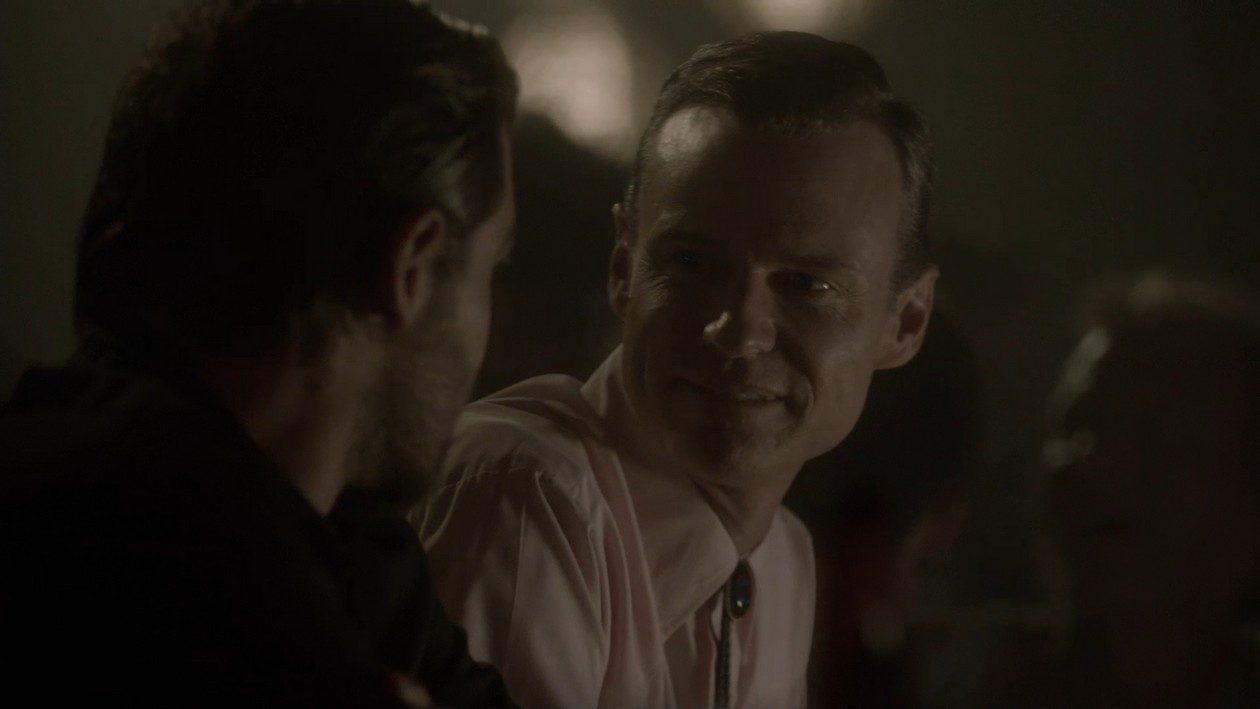
I was shocked by the sudden intolerance of the young and supposedly progressive Shafe, but perhaps I shouldn’t have been. In the ’60s, homosexuality was still listed in the Diagnostic and Statistical Manual of Mental Disorders, and it was more socially acceptable to be homophobic than not. Nonetheless, the portrayal of blatant homophobia from a lead character was upsetting, and some of the historically accurate terminology (“deviants”, “degenerate”, etc) wore on me. I don’t mean this as a criticism (although I will say that if homophobia is being used as a layer of moral complexity it fails, because in order for moral complexity in a character to be really effective, the audience must be able to sympathise with them). In fact, it wouldn’t be right to pretend that these prejudices didn’t exist. It may be especially important to hear those things coming from Shafe, precisely because it is so unexpected—it ought to shock the audience into realising that prejudice can be found everywhere.
That being said, at any given moment, Aquarius is spinning so many plates (undeniably good for the kind of watch where you can never get bored) that the police cases tend to get left hanging or are resolved off-screen in favour of the major personal storylines. These police cases provide otherwise absent queer or POC perspectives. Furthermore, Ken is the primary gay representation on the show, and the fact that he routinely succumbs to lust for Charles Manson doesn’t paint us in the best light. Eventually he sees Manson for who he is, and he begins to rectify his relationship with his daughter. Despite the fact that it is cut short by his murder (see: Bury Your Gays) his slow redemption is satisfying and tragic. He is even self-conscious about this: “I feel old. All the time I wasted”.
Of course one must portray prejudice honestly, but the idea that being gay has ever just been about prejudice is a myth. As the show’s brief forays into the gay scene begin to uncover, there were proud gay men alive in the ’60s whose stories are just as much an honest part of history. I suspect the key is a well-meaning balance of the two.
What Makes Something Heroic?
Internal Affairs thinks that Hodiak is a thug who shouldn’t be a cop, which is true. Hodiak’s attitude is cute when he’s bullying wet-eared drug dealers, but it grows more sinister. I’ll be the first to admit that you can adore a character who possesses…less favourable qualities; at the very least, Hodiak is self-aware. That being said, he is very much like the kind of hero he would have seen in the movies. Sam Hodiak is a white man, a manly white man who has his own punch bag; he fought in WW2; he’s good at sex (his girlfriend’s words, not mine); he’s enough of a rebel to be cool, but enough of a cop to demand respect; he keeps his Jewish heritage a secret, and he goes to church…occasionally. If he wanted to (and I don’t think he would), he could slot in next to James Bond, although he more likely sees himself as a cowboy.
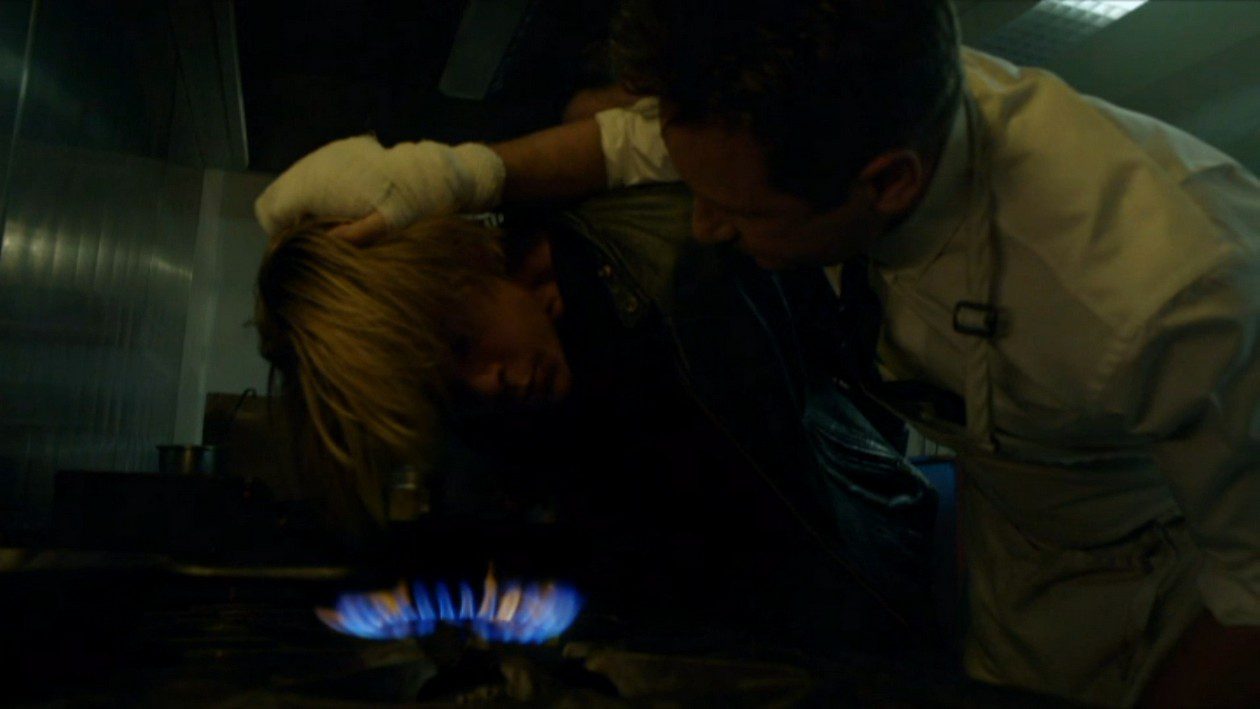
There’s a quote (purportedly) attributed to Joel McCrea: “I don’t believe in antiheroes. Duke Wayne played a mean guy but never an antihero”. In a way I feel the same about Sam Hodiak. For a start, I am skeptical of the antihero as a character type, since the list of examples can include both psychopathic serial killer Patrick Bateman and comedically unruly Jack Sparrow; moreover, the common argument is that antiheroes make great characters because they’re more “real” and, aside from the fact that Hodiak is probably the way he is for exactly this reason, I find this analysis very unhelpful. For a start, being realistic in a fictional world is not inherently good (boo to the modern obsession with hyper-realism). What is more helpful is understanding that all characters are heroes and villains, depending on perspective, and antiheroes are no different. Hodiak is a hero in the eyes of Bobby Kennedy, or early Season 1 Charmain. In the eyes of the Black Panthers, he is a villain.
“I did everything I could to make this country work; I went to war, I became a cop, and yes I did terrible things and I called it justice.”
— Sam Hodiak
A story need not contain any heroic characters, if that is how the story is best served; however, Hodiak’s son Walt is one character that I would consider unequivocally heroic. This is because no personal attachment stops him from wanting to do the right thing. It also helps that I have the 21st century perspective on exactly how terrible the Vietnam War was, but in the “foreign country” of the ’60s, Walt was not a hero but a “traitor”. Hodiak and Walt represent the generational gap that existed across America in regards to the war. Hodiak feels a sense of personal and national pride at being a survivor of WW2, and since America were the heroes of the conflict he views war itself as innately heroic. He criticises his father for remaining a pacifist through “the extermination of six million Jews”—this is a particularly strong argument for why war is heroic, and why winning it can justify fighting “ugly”.
On the other hand, in Season 2 Hodiak must confront a dark reality. He argues with a former Japanese POW about whether Manzanar was worse than the holocaust (the answer is of course that “one tragedy doesn’t erase another”). Hodiak—blinded by memories of fighting the war in Japan—is incensed by the suggestion that Manzanar was a concentration camp. This, like Vietnam, is a part of U.S. history that the country carries guilt for. Hodiak must face up to the fact that, just like him, America has been the villain as much as the hero. In these ways, Aquarius has shown that heroism is relative.
Conclusion
In regards to L.P. Hartley—sometimes it is hard to see Aquarius as “foreign”, because some of the social issues seem to speak directly to us in the 21st century. I think that Aquarius is a story about the collective versus the individual: the concept of justice must somehow serve both, and fails both. The individual must not disappear behind their identity, but they must also celebrate their community. Grace must take responsibility for her family, and Emma should not be beholden to it. Hodiak must see that his own experience of war is not the only experience of war, and Shafe must admit that being part of the LAPD makes him complicit in that particular collective’s prejudice. When we study history, we think of people in terms of the collectives, because it makes for a simpler narrative: Communists thought this thing, Black people wanted that thing, and so on. The foreignness of Aquarius, then, is the individuals—like Detective Moran, Kristin Shafe, and the Black man who was hated by the Panthers for straightening his hair. There is no “electric snake”; there never was.

